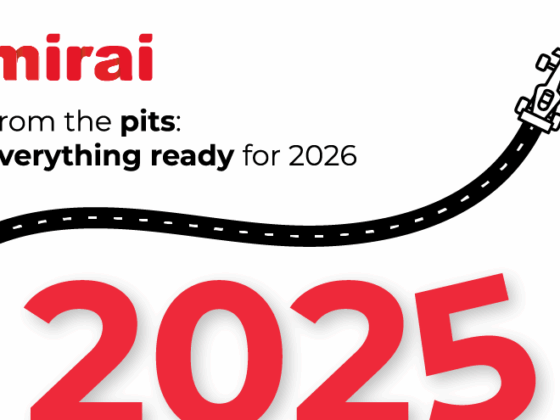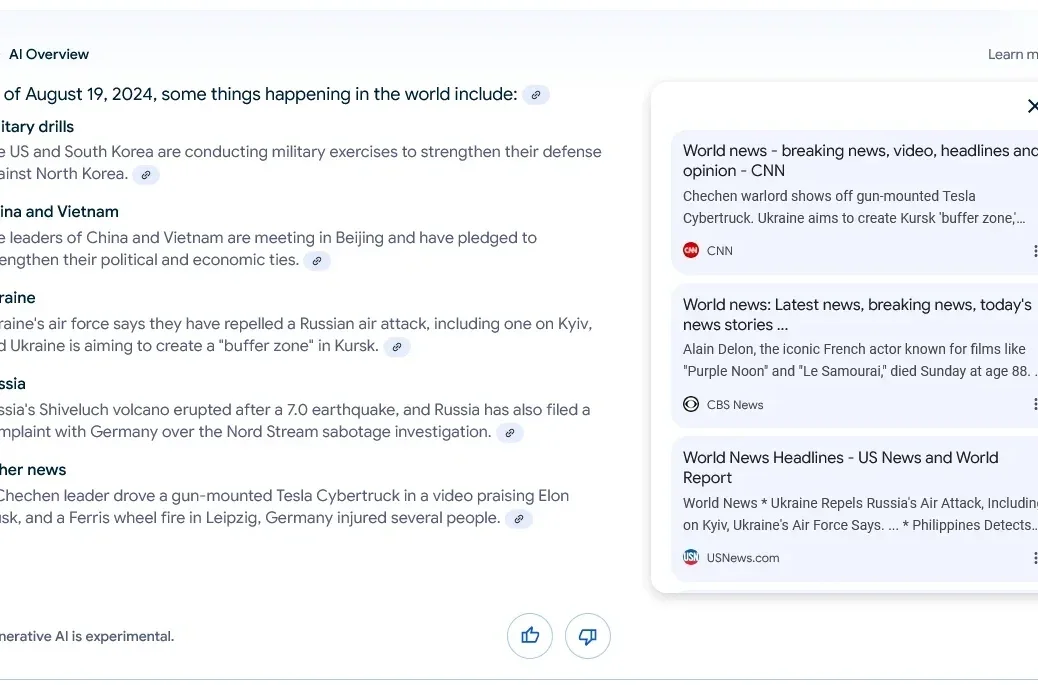
New research suggests Google AI Overviews are having a significant impact on the visibility of publishers within search results.
Google is now delivering AI-written summaries at the top of its search results for all users in the US and UK.
Google initially rolled out the technology in May in the US but cut it back after a number of wildly inaccurate AI-written answers were discovered.
Now, according to research consultancy Authoritas which has analysed 6,599 keywords across a broad spectrum of categories, AI Overviews are being offered for 17% of queries in the UK and US.
AI-written summaries are rarely delivered by Google for search queries relating to current events (the main picture of this story is a rare exception).
But AI summaries are already deeply impacting publisher visibility on search when it comes to less time-sensitive content.
Content from our partners
US consumer media site Martha Stewart, for example, formerly held the top spot in search results for “how to kill wasps”. Now an AI rewrite of the Martha Stewart article and others holds the top position in search results alongside sponsored links. The Martha Stewart article (which contains most of the information Google has used in its AI summary) is only reached on the third full-page mobile scroll.
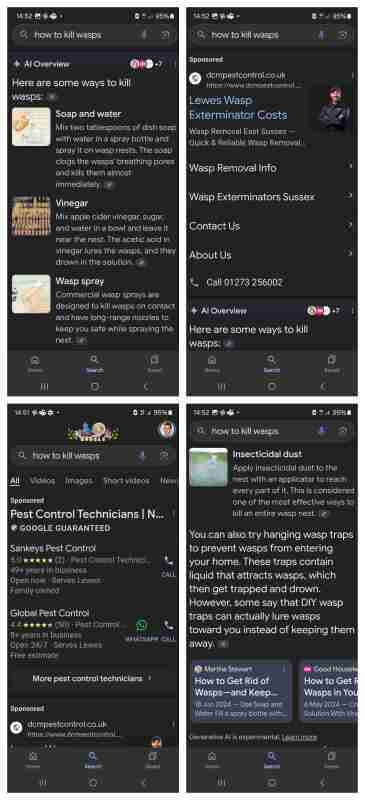
Similarly, a search for “who are the UK national newspaper editors” delivers an AI overview mainly based on the only source which keeps an up-to-date list, Press Gazette. The Press Gazette article from which Google takes most of its AI-written information is now pushed down to the bottom of the second mobile phone screen on search. It is worth noting that the Google summary still has Dylan Jones as editor of GQ whereas the up to date Press Gazette article has him as editor of the Evening Standard.
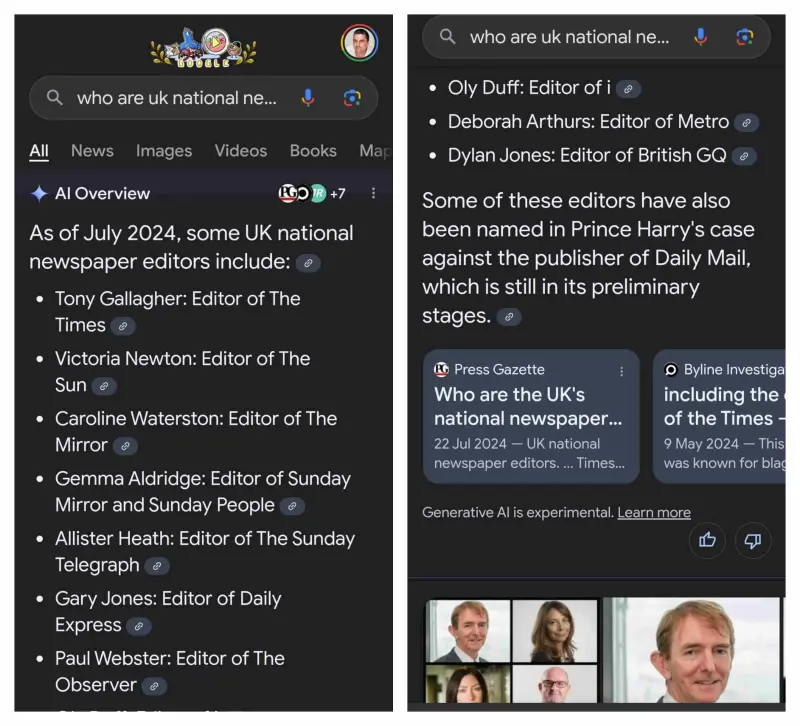
The AI Overviews result for the same query on desktop provides different (inaccurate) results which include non-editors Paul Dacre, Simon Heffer and John Stevens.
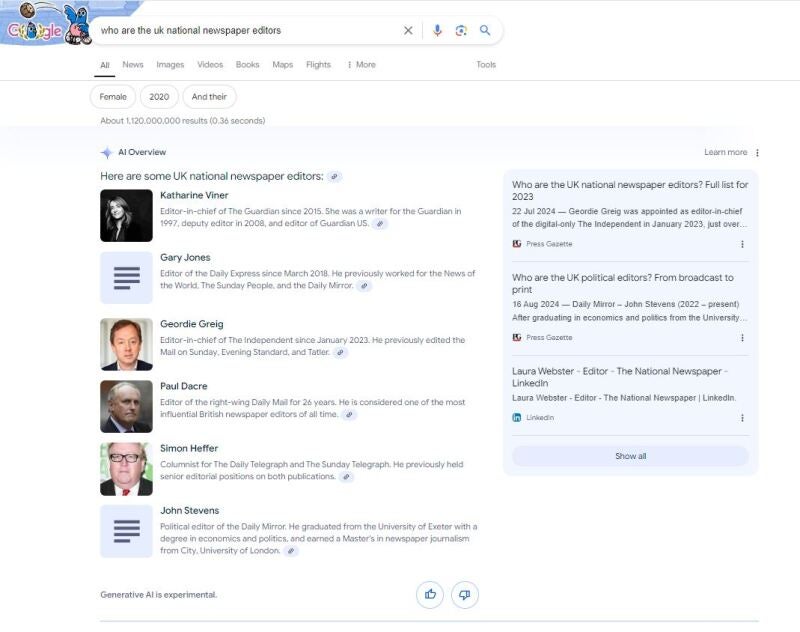
An AI Overviews answer (also including inaccurate names) comes up first even with the specific search “Press Gazette national newspaper editors”.
The link symbols on AI Overviews results are designed to keep readers on the Google website; rather than taking readers directly to the source, they open up a source window which requires a further click to open.
Authoritas CEO Laurence O’Toole said he believes Google AI Overviews [AIO] will become the norm for search results (and has written further on the issue here).
He said: “Once Google has launched it for the more limited range of topics they are now comfortable with in multiple countries, then they will expand the breadth of topics for which an AIO result is shown.”
Asked what this will do for to clickthroughs and publisher traffic, he said: “Google is not going to share any useful information in Google Search Console – so we will have to build new tools and models to estimate the impact using our SERPs API data and Google Search Console data.
“It’s impossible to say for sure how this will impact publishers – if you are the first ranking site in the new AIO list on desktop then you’ll probably do quite well. One thing for sure though is your current top organic listings are going to get demoted down the page which is going to have a negative impact unless you have a prominent position in the AIO.”
He said his research has found that in six out of ten cases Google AI Overviews are linking to pages outside the top ten links returned in normal search results. This means AI Overviews are likely to have a dramatic impact on current search rankings and so publisher traffic.
Google is the single biggest source of traffic for most news publishers, typically accounting for between a third and half of all site visits.
O’Toole said: “These findings suggest that even if your past organic ranking efforts have laid a strong foundation, the introduction of AI Overviews could mean significant rework is needed to maintain your competitive edge.”
Press Gazette conducted research on Google AI Overviews durings its previous US rollout in May and found AI-written summaries were being offered for around 24% of the most important search quieries shared by a group of leading publishers. In cases where an AI overview was offered, the organic results (dominated by publisher articles for these queries) were pushed down by an average of 980 pixels (or one full page scroll).
Email pged@pressgazette.co.uk to point out mistakes, provide story tips or send in a letter for publication on our “Letters Page” blog









